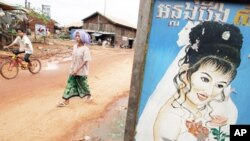Under the Khmer Rouge, Cambodians saw a new method of marriage previously unheard of in their traditional way of life. Under the policies of the regime, forced marriages looked more like political meetings than the union of husband and wife.
As many as 160 couples were married at a time under the policy, and neither the bride nor the groom could protest the union.
Those marriages, and the trauma they may have caused, are now at the center of a movement by some groups to have gender crimes added to those already facing Khmer Rouge leaders at the UN-backed tribunal.
Legal experts from many countries, including the US, Germany and Rwanda met at an international conference in Phnom Penh for two days earlier this month to consider gender-based violence under the regime.
“If they didn't go into marriage, they would be accused of misconduct,” Kalyanee Mam, a researcher at the Documentation Center of Cambodia, said recently. They could be accused of “having other lovers, and that they were not loyal to the organization,” she said. “Therefore, all people had to agree to the marriage. There were some who tried to deny the marriage...but they would be imprisoned or killed.”
Some who were forced to marry under the policy learned of the arrangement only moments before they were wed, she said.
“They were forced to marry those who didn't have hands or legs,” she said. The Khmer Rouge “forced newcomers to marry base people who did not have eyes. They did not have time to look at each other, because the marriage consisted of more than 100 couples. They just had a short time to glance at each other.”
As many as 200,000 people were forced into marriage during the Khmer Rouge rule between 1975 and 1979, according to research.
In interviews with journalists, Nuon Chea, the chief ideologue of the regime, who is now in detention awaiting trial at the tribunal, defended the policy, saying the Khmer Rouge needed to bolster the populace. Had they allowed people to choose for themselves, he has said, those injured in fighting would not have had partners.
Natalae Anderson, a researcher at Rutgers University in New Jersey, said some couples ended up staying together after they had children. Others resorted to divorce.
Either way, the forced marriages led to mental or physical trauma, as people were deprived of a pivotal life decision, were coerced into relationships and were forced to raise children from the policy.
“This is a crime against humanity,” said Beini Ye, a legal adviser for the Cambodian Defenders Project. “Because victims were forced into a marriage without having the chance to chose their husband or wife; and they were later forced into having sex. This is a violation to both of them. For men it is a violation for them, and it is the same for the women. Therefore, forced marriage should be investigated and charged in international courts such as the Khmer Rouge tribunal.”
Sin Soworn, a lawyer for the project, said 138 people have filed complaints with the Khmer Rouge tribunal demanding compensation for their forced marriages.
“Forced marriage under the Khmer Rouge period was not just done to females,” she said, “but males as well. These marriages were planned and forced without the consent of either party.”




